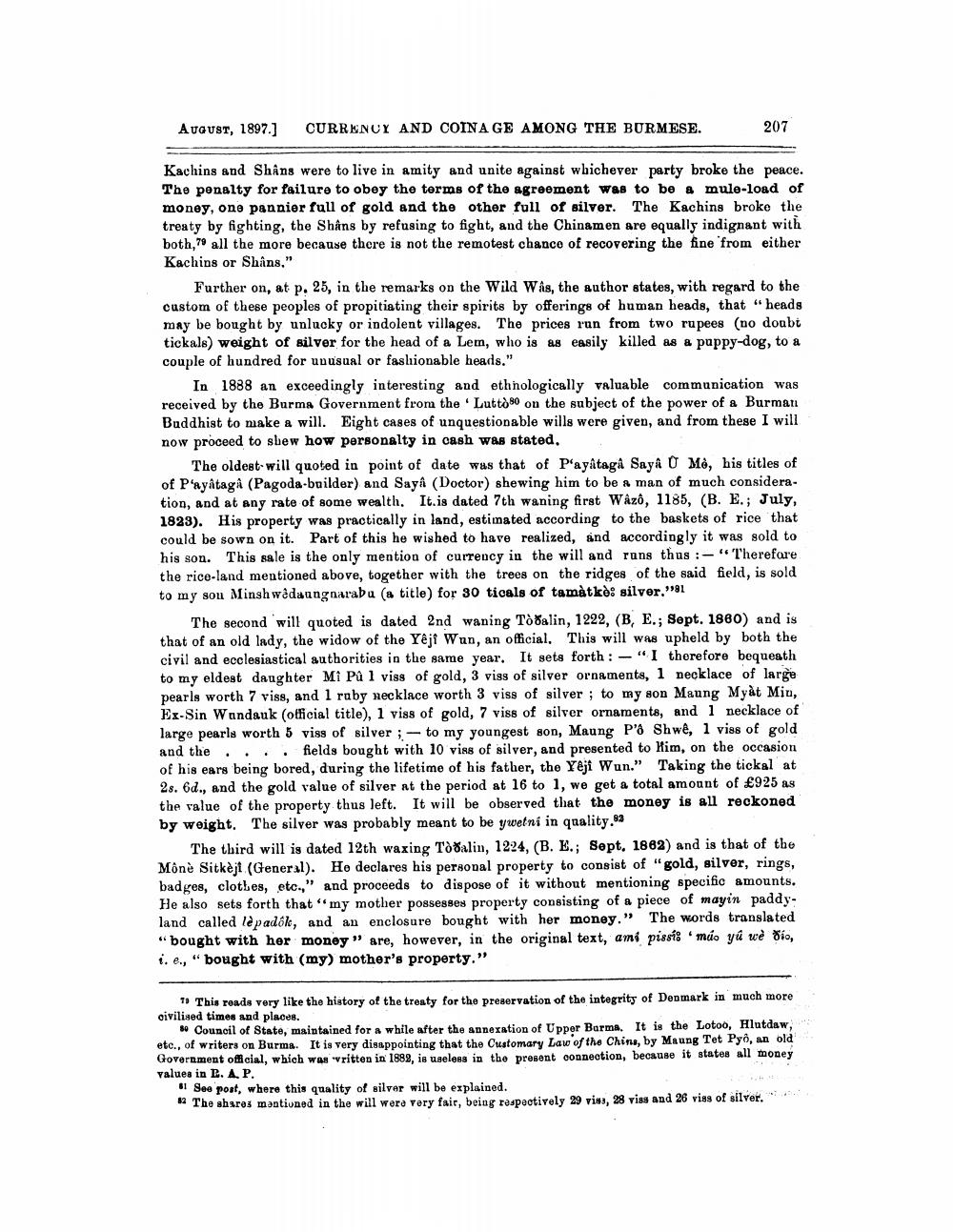________________
Avaver, 1897.]
CURRENCY AND COINAGE AMONG THE BURMESE.
207
Kachins and Shans were to live in amity and unite against whichever party broke the peace. The penalty for failure to obey the terms of the agreement was to be a mule-load of money, one pannier full of gold and the other full of silver. The Kaching broke the treaty by fighting, the Shans by refusing to fight, and the Chinamen are equally indignant with both, all the more because there is not the remotest chance of recovering the fine from either Kachins or Shans,"
Further on, at p. 25, in the remarks on the Wild Wás, the author states, with regard to the custom of these peoples of propitiating their spirits by offerings of human heads, that "heads may be bought by unlucky or indolent villages. The prices run from two rupees (no doubt tickals) weight of silver for the head of a Lem, who is as easily killed as a puppy-dog, to a couple of hundred for unusual or fashionable heads."
In 1888 an exceedingly interesting and ethnologically valuable communication was received by the Burma Government from the 'Lutto so on the subject of the power of a Burman Buddhist to make a will. Eight cases of unquestionable wills were given, and from these I will now proceed to sbew how personalty in cash was stated.
The oldest will quoted in point of date was that of Payataga Saya U Me, his titles of of Payataga (Pagoda-builder) and Saya (Doctor) shewing him to be a man of much consideration, and at any rate of some wealth. It is dated 7th waning first Wazô, 1185, (B. E.; July, 1823). His property was practically in land, estimated according to the baskets of rice that could be sown on it. Part of this he wished to have realized, and accordingly it was sold to his son. This sale is the only mention of currency in the will and runs thus :- "Therefore the rico-land mentioned above, together with the trees on the ridges of the said field, is sold to my sou Minsh wadaungnarabu (a title) for 30 ticals of tamàtko: silvor."91
The second will quoted is dated 2nd waning Totalin, 1222, (B, E.; Sopt. 1860) and is that of an old lady, the widow of the Yêjf Wun, an official. This will was upheld by both the civil and ecclesiastical authorities in the same year. It sets forth : -"I thorefore bequeath to my eldest daughter Mi Pů 1 viss of gold, 3 viss of silver ornaments, 1 necklace of large pearls worth 7 viss, and 1 ruby necklace worth 3 viss of silver ; to my son Maung Myat Miu, Ex-Sin Wandauk (official title), 1 viss of gold, 7 viss of silver ornaments, and l necklace of large pearls worth 5 viss of silver ; - to my youngest son, Maung P'd Shwe, 1 viss of gold and the .... fields bought with 10 viss of silver, and presented to Him, on the occasion of his ears being bored, during the lifetime of his father, the Yēji Wun." Taking the tickal at 2s.6d., and the gold value of silver at the period at 16 to 1, we get a total amount of £925 as the value of the property thus left. It will be observed that the money is all reckoned by weight. The silver was probably meant to be ywetni in quality.82
The third will is dated 12th waxing Toðalin, 1224, (B. E.; Sopt, 1862) and is that of the Mônè Sitkejt (General). He declares his personal property to consist of "gold, silver, rings, badges, clothes, etc.," and proceeds to dispose of it without mentioning specific amounts. He also sets forth that my mother possesses property consisting of a piece of mayin paddyland called lè padok, and an enclosure bought with her money.” The words translated "bought with her money" are, however, in the original text, ami pissí: múo yú wè día, i. e., "bought with (my) mother's property."
11 This ronds very like the history of the treaty for the preservation of the integrity of Denmark in much more civilised times and places.
# Council of State, maintained for a while after the annexation of Upper Barma. It is the Lotoo, Hlutdaw, etc., of writers on Burma. It is very disappointing that the Customary Law of the Chine, by Maung Tet Pyo, an old Government official, which was written in 1882, is useless in the present connection, because it states all money values in L. A. P. "I See post, where this quality of silver will be explained.
The shares mantioned in the will wera very fair, being respectively 29 viss, 28 viss and 26 viss of silver.




